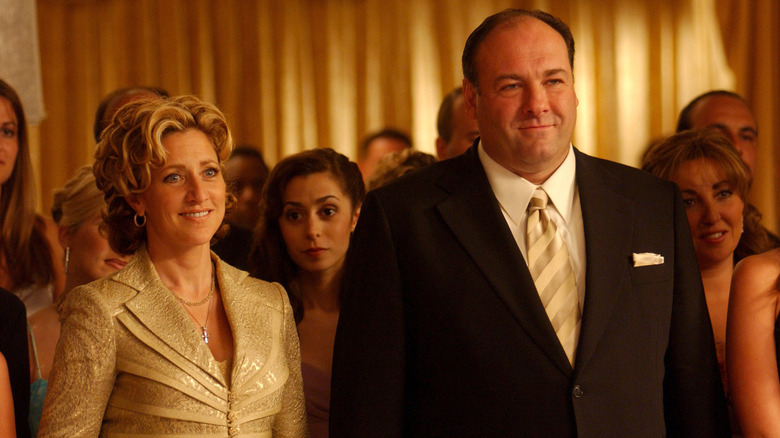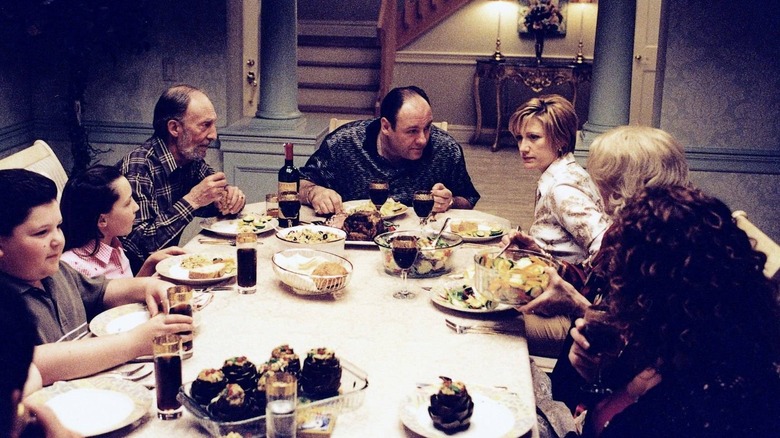A Sopranos Casting Call Was Shut Down By The Police When A Mob Showed Up
All due respect to "Shasta McNasty," but David Chase's "The Sopranos" is easily the most important television show of the last 25 years. The series about a New Jersey mobster whose worsening anxiety, brought on by the dueling stressors of work and family, forces him into therapy was an instant pop cultural sensation when it debuted January 10, 1999 on HBO (beating Harold Ramis' similarly themed "Analyze This" to release by a mere month). After around 70 years of gangster movies and television shows, we knew these guys operated in high-pressure environments; we just never considered they might see a shrink to deal with it.
Of course, a clever concept only gets you so far, something Chase — a veteran TV writer with Primetime Emmy-nominated credits on "The Rockford Files," "I'll Fly Away" and "Northern Exposure" — clearly understood. Go back and watch the first few episodes of "The Sopranos," and you'll be amazed at how fully fleshed out this world was from the outset (and how that controversial finale is where how it was always destined to end). By the end of the pilot, we feel like we've spent a full season with Tony (James Gandolfini) and Dr. Jennifer Melfi (Lorraine Bracco). And as the series goes on, this familiarity is both comforting and horrifying, sometimes in the same moment.
Despite the show's violence, Tony's resistance to and eventual acceptance of therapy helped destigmatize the notion of seeing a doctor for the betterment of one's mental health (most importantly, it accurately depicted the ebb and flow of the process, that working on oneself is a lifetime commitment). But according to David Chase, this wasn't the show's only positive contribution to society. It allowed a certain segment of the population to feel seen.
A watershed show for Italian-Americans
In a recently published retrospective interview with Empire, Chase discussed how "The Sopranos" impacted Italian-Americans. Yes, the show had a broad ethnographic appeal, but it was a special source of pride for people who, aside from the works of Francis Ford Coppola and Martin Scorsese, often felt caricatured than accurately depicted. To illustrate what the show did for the Italian-American community, Chase recalled a chaotic moment after the pivotal second season. As he told Empire:
"We once had an open call for actors in Harrison, New Jersey, and 13,000 people showed up. The police had to shut it down. The exit on the turnpike was completely screwed up. And they were all Italian. All 13,000."
He's not exaggerating. The open call was entertainingly covered by Entertainment Weekly in July 2000, and the reporter on the scene spoke with some very colorful characters. Take 27-year-old Paulie Priesta, for instance, who arrived at the audition dressed to kill in a black suit. "I just want to be famous," the Manhattanite told EW. "My dad told me to be a lawyer. I became a lawyer and now I'm bored. But I got pizzazz — that's what I got going for me."
Also eager to make TV history was Westchester, New York native Lisa Merelli. "I wanna be Carmella's sister," she said. Evidently, she was sporting the kind of flamboyant, tight-fitting dress and salon-tanned skin that would fit right into this mobbed-up universe.
"The Sopranos" would last another seven years, and never pulled a single punch. It was often operatic in its emotional pitch, but at a domestic level, rub-outs aside, we could relate to the tumultuous highs and lows of the Sopranos clan. This was a brilliant show about family. And family is never, ever easy.

